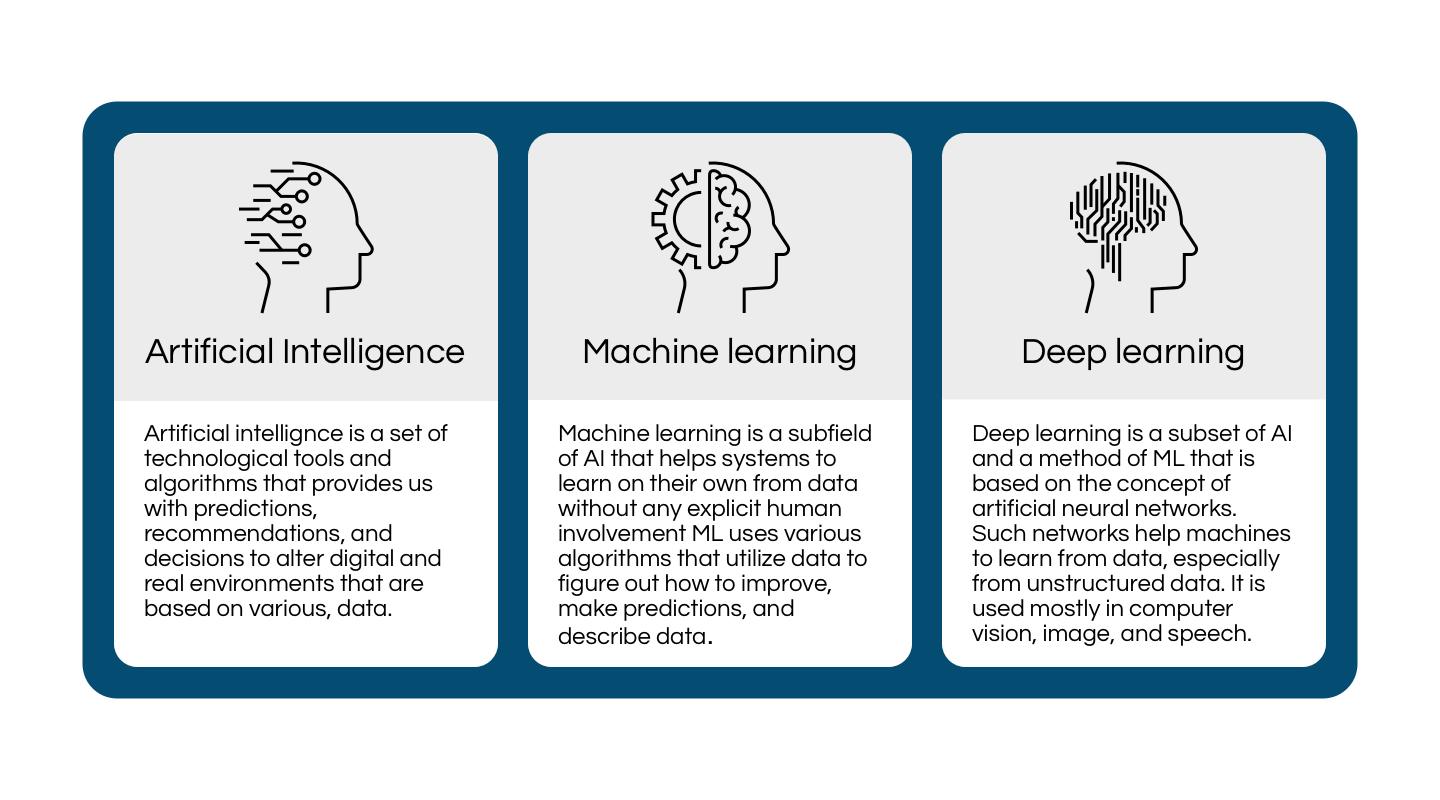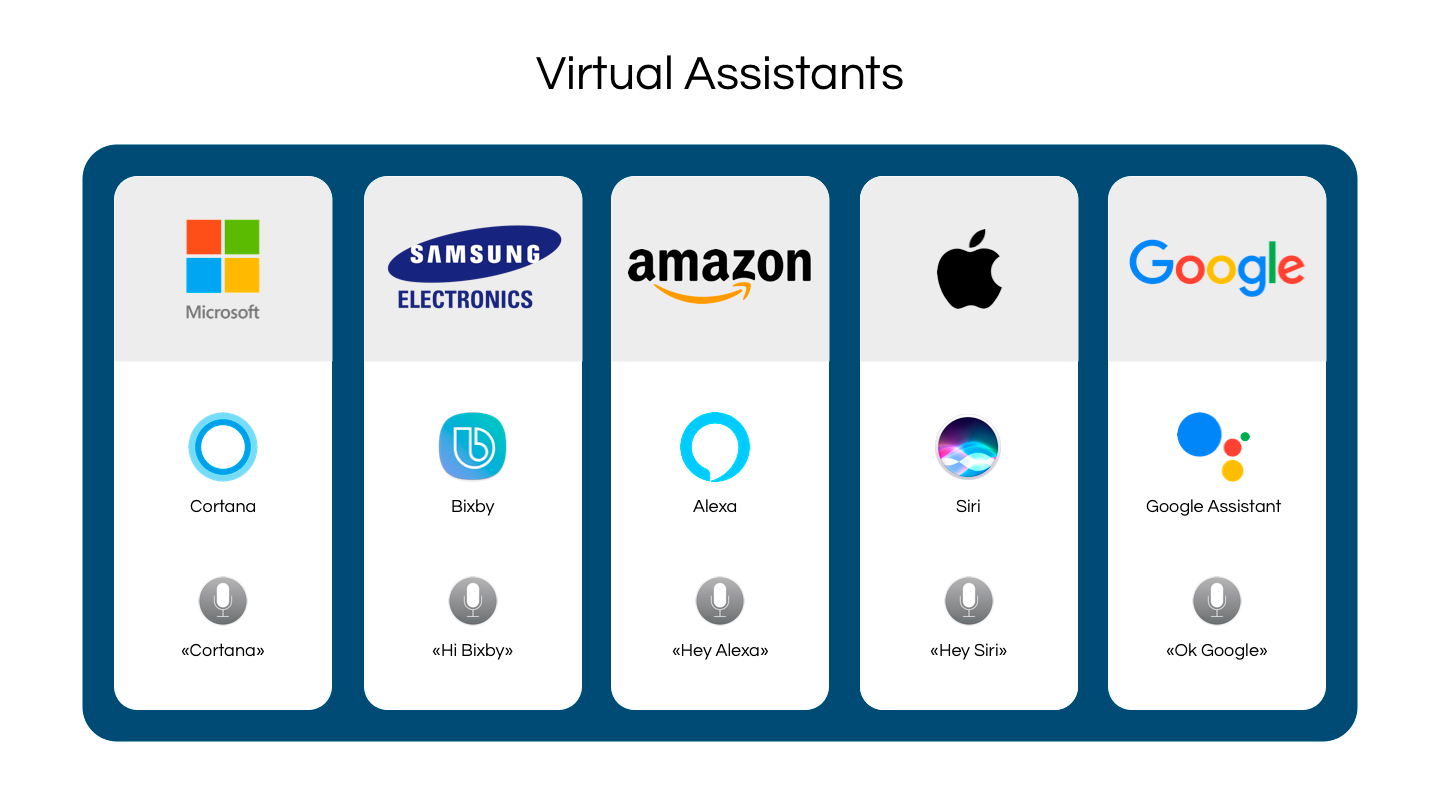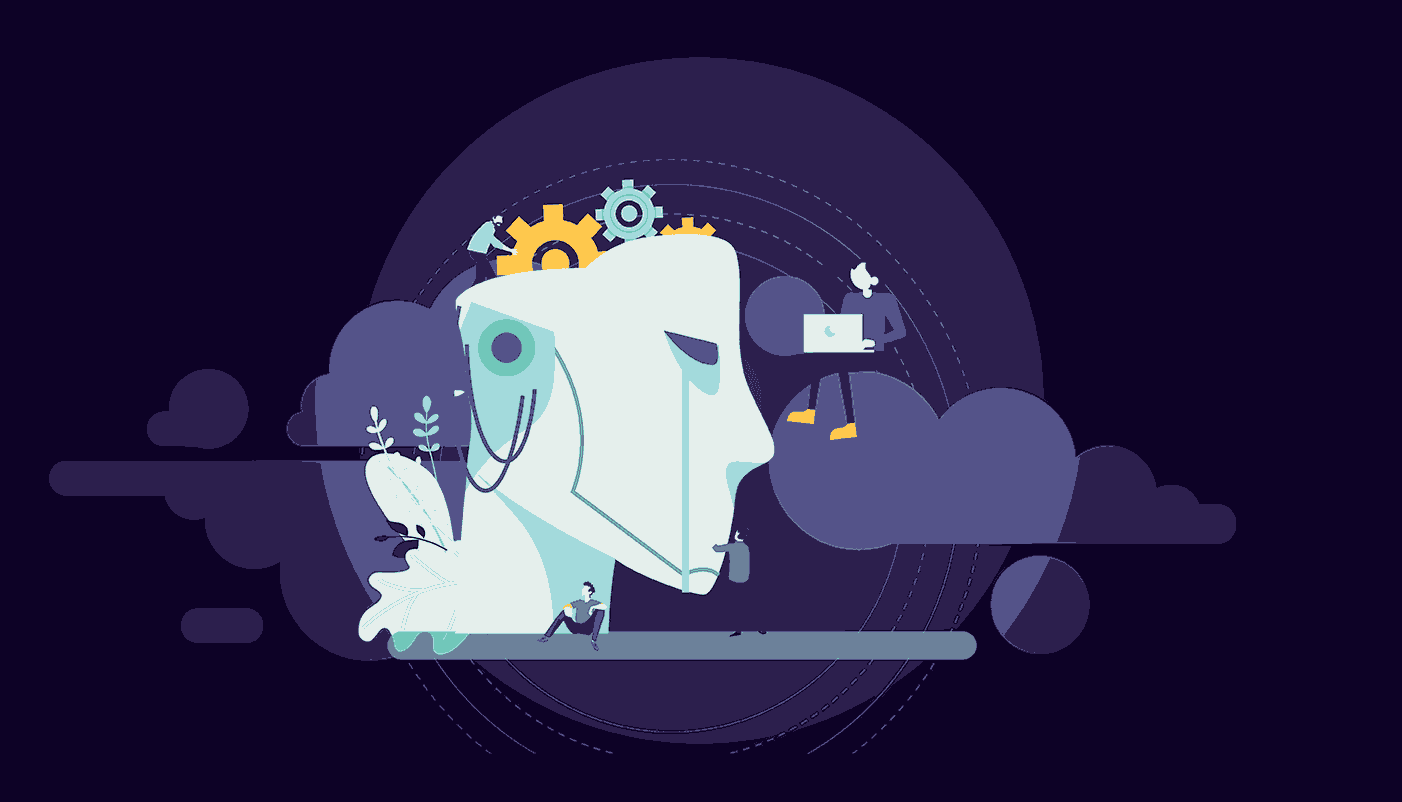For many, artificial intelligence (AI) has quietly integrated into our daily lives, permeating workplaces, homes, cars, smartphones, and laptops. It’s deeply woven into the fabric of our existence, understanding our entertainment preferences, musical tastes, and even our ideal partners. Beyond our personal realms, AI is revolutionizing industries such as automotive, healthcare, economy, e-commerce, and entertainment. As AI continues to evolve, its influence is set to expand further.
But how AI is changing the world today? And what are its broader impacts on society, business, economy, and the world at large?
This article delves into the burgeoning realm of AI, offering insights into how it’s reshaping our lifestyles and professional landscapes, and the profound changes it’s already instigating in society.
How Artificial Intelligence Learns
Artificial intelligence (AI) has become a ubiquitous term, but its inner workings can often feel like a mystery. Here’s a simplified breakdown of how AI learns and performs intelligent tasks:
Data: The Fuel for Learning: Just like humans learn from experience, AI thrives on data. Large amounts of data, relevant to the desired task, are collected and meticulously prepared. This data could be text documents, images, audio recordings processed with tools like an audio waveform visualizer, or even sensor readings from machines.
Algorithms: The Learning Engine: AI employs powerful algorithms to analyze and learn from the data it’s fed. These algorithms act like mathematical formulas, uncovering patterns, relationships, and hidden insights within the data. Here are some key types of AI algorithms:
-
- Machine Learning: These algorithms, unlike traditional programming, learn independently without explicit instructions. They continuously improve as they process more data. There are two main categories:
- Supervised Learning: Imagine a teacher guiding a student. Supervised learning algorithms are trained on data with pre-defined answers. For example, an image recognition system might learn to identify objects in pictures by being shown labeled examples (cat, dog, etc.).
- Unsupervised Learning: Here, the AI acts like a detective, uncovering hidden patterns on its own. Unsupervised algorithms might analyze customer data to automatically group similar customers together for targeted marketing campaigns.
- Deep Learning: Inspired by the human brain’s structure, deep learning algorithms use complex artificial neural networks to process information and learn intricate patterns. This is often used for tasks like image and speech recognition, or even generating realistic text.
- Machine Learning: These algorithms, unlike traditional programming, learn independently without explicit instructions. They continuously improve as they process more data. There are two main categories:
Training and Refinement: The AI model is trained on the prepared data using the chosen algorithms. This process can be intensive, requiring significant computing power for complex models. As the model ingests the data, it iteratively adjusts its internal parameters to become more accurate and effective.
Testing and Evaluation: Once trained, the AI model undergoes rigorous testing with a separate dataset. This helps identify any biases or weaknesses in the model, allowing for further fine-tuning.
Making Predictions and Decisions: Finally, the well-trained AI model is deployed to perform its intended task. This might involve making predictions, classifications, or recommendations based on entirely new, unseen data. For instance, a product recommendation system might analyze your past purchases and browsing behavior to suggest items you’d likely enjoy.
The field of AI is constantly evolving, with new algorithms, computing architectures, and data sources emerging all the time. While AI can achieve remarkable feats, it’s not a magical black box. Understanding these core principles empowers us to utilize AI responsibly and effectively for a brighter future.
How Artificial Intelligence is Changing the World?
To understand how artificial intelligence is transforming the world, you need to get the gist of what AI is in the first place. Unfortunately, there is no precise and widely accepted description of what artificial intelligence is. Besides, when you are trying to look it up on the internet, you get dozens of definitions from different sources and people.
To make it more straightforward and understandable, we are going to sum it up as follows:
AI is a set of technological tools and algorithms that provides us with predictions, recommendations, and decisions to alter digital and real environments that are based on various data.
Artificial intelligence is supposed to perform the tasks that initially were considered to be predominantly done by humans.
AI has two major subsets, which are machine learning (ML) and deep learning (DL.) To provide you with the definitions of ML and DL, let’s draw the following distinction between how humans and machines differentiate between two objects. Without going into details about how your brains work, you, as a human being, can easily and quickly set things apart due to your past experiences. But how can machines do this? How can they distinguish between two things? They do it with the help of ML and DL.
- Machine learning is a subfield of AI that helps systems to learn on their own from data without any explicit human involvement. ML uses various algorithms that utilize data to figure out how to improve, make predictions, and describe data.
- Deep learning is a subset of AI and a method of ML that is based on the concept of artificial neural networks. Such networks help machines to learn from data, especially from unstructured data. It is mostly used in computer vision, image, and speech recognition.

Now, as you know the basics of AI and its subsets ML and DL, we can move on to see how AI will change the world.
Examples of Artificial Intelligence in Everyday Life
The impacts of artificial intelligence is not only visible but also tangible. Take out your Android phone and say, “Ok, Google.” Once you’ve uttered it, you’ll hear a pleasant woman’s voice. This is artificial intelligence in its manifestation as virtual assistants, or, as sometimes also called chatbots. However, it should be noted that some companies and people still prefer to distinguish between chatbots and virtual assistants.
Many major companies offer their own artificial intelligence assistants: Microsoft uses Cortana, Samsung Electronics utilizes Bixby, Amazon has Alexa, Apple offers Siri, and Google has Google assistant, respectively. These AIs can understand human commands and respond accordingly. For instance, Siri can turn the music at your place, or Google Assistant can type a message for your friend at your request, or Alexa can open your Uber app. But, AI in your smartphone will be able to go far beyond.

Probably, many of you have seen a video, where Google’s CEO Sundar Pichai presented in 2018 Google Duplex, an upgrade of Google Assistant that can understand context. The presentation was entertaining and at the same time, somewhat uncanny. In the first part of the Google Duplex presentation, the AI was making an appointment at a beauty parlor over the phone, and the lady on the other side didn’t suspect a thing. She didn’t realize that she wasn’t talking to a human being. Google Duplex was so convincing you could hardly tell the difference between a real person and AI. It could perfectly imitate human speech flow and drop hedges like “um,” “mm-hmm,” “oh,” understand questions and respond in a human-like manner. It looked as if two people were having a mundane conversation.
On November 21, 2019, Google announced that Google Duplex can also purchase a movie ticket for you on the web! It is now available in almost all states across the USA, and you can use the updated Google Assistant to make reservations at a restaurant, an appointment at a salon, and also buy movie tickets. Who knows what’s going to be the next step for this virtual assistant.
There are also multiple examples of artificial intelligence today on your phone. You can use AI everywhere as artificial intelligence removes borders. If you are traveling to Japan, and you try to read a sign in the Japanese language, you can use your smartphone to recognize the foreign characters. This is also a manifestation of how artificial intelligence will change everything, even the way we communicate with the outside world.
Impact of Artificial Intelligence on Society
Artificial intelligence is still far from the futuristic image you might have in your mind — flying cars or AI robots like in Ex Machina that can easily pass for humans. Still, many people and companies have high expectations from artificial intelligence effects on society in the future. One of such expectations is significant breakthroughs in drug discovery.
Many believe that AI can be used to discover new drugs. Indeed, artificial intelligence can become a perfect solution for many R&D centers that are looking for brand new drugs, which is a highly expensive and time-consuming discovery process. Scientists have to be perfectly aware of how a molecule’s properties can be affected by its structure. Then they need to figure out what kind of components can make a really good and effective medicine. Unfortunately, such chemical endeavors end up being a costly flop, because there are so many possible variants that it’s absolutely out of the question for a human being to test them all. This is when the subset of AI — machine learning can be an excellent tool for those who are trying to discover the right properties for a new and powerful drug.
Trained on information on molecules, their structure, and attributes, artificial intelligence can already predict properties of a synthesized compound. And what is needed now for AI is to quickly create new molecules with necessary properties to come up with the desired medicine. If this system is invented in the near future, it will probably be one of the most significant artificial intelligence impact on society that will cure lethal diseases.
How Can Artificial Intelligence Benefit Humans?
Drug discovery can be not the only AI benefit this technology can provide humans with. Another challenge that humanity is facing right now and which can be prevented with the help of AI is the discovery of new and sustainable materials.
In most cases, it takes from 15 to 20 years to discover a new material, but it is believed that artificial intelligence can speed up the process to a time frame of 5 years. For instance, Northwestern University has already used machine learning to accelerate the production and discovery process. They managed to understand how to make glass much faster than ever before. Besides, as with drug discovery, artificial intelligence can invent new compounds and properties to create a new type of material.
Impact of Artificial Intelligence in Everyday Life
How does artificial intelligence affect our lives in other spheres? You might not even notice it, but one of the main manifestations of AI is in the way we entertain ourselves and meet new people, or encounter our partners online. We, as smart human beings, will always derive considerable pleasure from books, music, TV shows, and movies we like. And without giving it much thought about what lies behind our everyday activities, we use recommendation systems to choose entertainment for our liking. These are just a few uses of artificial intelligence in daily life. And the chances are — you know these examples of AI very well.
- YouTube recommendation engine
Owned by Google, YouTube is probably one of the most popular platforms for sharing video content in the world. You can find whatever your heart desires — from various beauty and cooking tutorials to music videos, vlogs, and news. According to Omnicore, YouTube has 2 billion active users monthly and 30 million active users per day. Although the number of viewers is huge, the platform uses AI to provide viewers with the videos that they are interested in and block those that, for instance, might be terrorism-related or have any other violent nature.
- Netflix recommendation engine
Why is Netflix so popular? It just knows what you want and what you most likely will love to watch. The company is at the forefront of the entertainment industry as the leading content creator. Its recommendation system or engine comes up with TV show and movie suggestions that are based on your viewing history. Moreover, Netflix calculates how many times you’ve seen a particular film or TV series, rewound, or fast-forwarded, not to mention how you have rated content.

In one of the Wired articles, it was stated how machine learning boosts this recommendation system. People at Netflix have all the necessary information about your preferences at their fingertips. They know what content you have watched and when. The employees and freelancers also view all the Netflix video content and tag it. The tags contain various information — setting, character, or cast. Then they use ML algorithms, user behavior data, and these tags to understand what things are the most important and what matters the most.
Netflix has multiple groups that vary according to different criteria and as a result, you get TV shows and movies that you like and even your video thumbnails are different.
- Google Translate
It wouldn’t be fair not to mention Google and especially Google Translate, which uses machine learning to help you translate text from a source language to the target one. The company has a lot of contributors across the globe, which means that any person in the world can contribute to Google Translate by entering some words like synonyms or anything else related to languages. Depending on these contributions, an ML model is changing and updating itself every day and becoming more and more proficient.
- Google Maps
Google Maps is probably another of those examples that can help us understand artificial intelligence in our daily lives. For instance, if you want to get from your place to a fancy nightclub, you use Google Maps. It makes predictions of what are the most efficient ways for you to get to the place.
There are some apps that combine virtual reality and Google Maps to provide immersive experience — just point the camera of your phone on a building and see information about it.
- Social media sensitive content search and search
Here is another example of artificial intelligence in real life. Pinterest is a social media platform full of various images that inspire people to discover new ideas. First of all, Pinterest uses an AI-enabled feature to identify if the image you upload is of any indecent or sensitive nature and must be banned from the platform. Secondly, Pinterest has an option that allows you to search for the necessary picture using only a fraction of it. For instance, you really liked the dress which was worn by a local celebrity at a party, and you want to look it up on the social media platform. The chances are — you will definitely find it. With the help of machine vision, Pinterest is looking for exactly the same dress of the same designer, material, and color.
- Match finding in dating apps
Artificial intelligence does not only know what kind of video content you prefer and help you find movies and TV series that you are definitely going to watch, but it also can find you a suitable partner. For instance, Badoo is a dating app and website where people can meet and chat online as well as find a date. According to DMR — Business Statistics, the application has 60 million monthly active users and 418 million registered ones (as of 3/29/2019).
But Badoo is not an average dating app. It utilizes artificial intelligence and facial recognition to help you find love that looks like your favorite celebrity or even your ex-boyfriend or girlfriend. Just upload an image of the person you fancy. And voila, you’ve got your Badoo lookalike match!
Badoo is not the only dating app that actively uses artificial intelligence. Among such apps, you can find eHarmony, Hola, Hily, and many others.
- Photo and video editing apps
If you are a photo and video enthusiast, you can use artificial intelligence to create really eye-catching and impressive content. Toolook is an AI-powered photo and video editor app that allows you to do exactly that. You can use various filters to turn your photo into a painting, caricature, or simply into a masterpiece. You can also utilize AI to edit your videos and add really marvelous effects.
These examples of artificial intelligence are only a tiny fraction of AI in daily lives.
Artificial Intelligence Trend that will Dominate Our Lives
Artificial intelligence is becoming more and more available to mass audiences. Now you have it in your pocket, and in other things too. AI has been already implemented into smart home devices like home-security, air condition, and light control systems. Internet of Things (IoT) represents a wide variety of devices that are connected to the Internet to share data with other devices.
When IoT meets artificial intelligence, it’s highly likely to be among the dominant trends that will influence our everyday lives. AI can help devices to learn from each other and autonomously make decisions without human interventions.
AI Application in Business
AI is going to be an integral part of almost every business domain. Automotive, marketing, and advertisement, agriculture, healthcare, e-commerce, criminal justice, and many others will definitely benefit from using artificial intelligence. Let’s see some significant examples of AI applications in business.
- Artificial intelligence in the automotive industry
When you think about artificial intelligence in automobiles, the first thing that comes to your mind is a self-driving car. Even though hardly any vehicle is fully autonomous, self-driving cars are not that distant and obscure future anymore.
According to The National Highway Traffic Safety Administration, which truly believes that artificial intelligence will help vehicles drive us safely without any human intervention, highlights six levels of autonomous driving:
- Level 0 or No Automation
There is no automation on this stage, and the person is fully responsible for controlling the vehicle;
- Level 1 or Driver Assistance
The vehicle can sometimes control itself in some cases, for instance, in steering or accelerating. But the vehicle can’t do these things simultaneously, and human control is required;
- Level 2 or Partial Automation
At this level, the vehicle can be in control. For example, both steering and accelerating, and the person can take control of the vehicle at any time. Still, the person has to stay vigilant as to the environment and conditions;
- Level 3 or Conditional Automation
The vehicle can perform all driving activities, but the person should remain alert and take over the driving when needed;
- Level 4 or High Automation
Such cars can drive autonomously and intervene when something goes wrong. Level 4 vehicles do not require human intervention.
Companies as Volvo and Baidu, Waymo, Magna, NAVYA are working on the technology that can provide cars with Level 4 capabilities.
- Level 5 or Full Automation
This stage presupposes the full self-driving capabilities of the vehicle in any situation. Level 5 vehicles will be fully autonomous and won’t require human intervention. Moreover, such cars might not have driving wheels or even brakes, and the person can be a mere passenger while the vehicle is fully in charge of driving. Level 5 vehicles are still being tested and are not available to the public.
Even if fully autonomous vehicles might be unavailable at the moment, many automotive companies are on the way of producing such cars.
- Artificial intelligence in advertising and marketing
It might be too early to talk about what the full impact of artificial intelligence is going to have on marketing and advertising. Still, the technology does have some good potential that can be unlocked in the future. For example, personalization is going to be the new black in marketing and advertising. If you target people using the same marketing techniques, tools, and methods, do not expect you’ll yield spectacular results in time to come. But AI can be a real game-changer in how marketing and ads campaigns are being run today. For instance, personalized advertisements are a hit with various companies. Such corporate giants as Facebook, Google, YouTube, have already been using ads powered by AI for targeting specific audiences.
Personalized pricing is going to become a new way of selling products and services. Artificial intelligence will predict the highest price a consumer can pay for a particular item by adjusting it according to the user’s behavior.
- Artificial intelligence in the healthcare industry
Another example of AI for business is artificial intelligence in the healthcare industry. Right now, humanity is facing significant challenges in battling multiple deadly diseases such as cancer, Alzheimer’s, AIDS, diabetes, and many others. These diseases are the leading causes of death, not only in the US but throughout the whole world. Sadly, we are far from finding a cure. Technology can help you in leading a healthy lifestyle that significantly reduces the risks of developing life-threatening illnesses. But many people do believe that artificial intelligence can go further as to help to achieve crucial breakthroughs in the healthcare industry.
Unfortunately, many patients pass away because they were diagnosed with a terminal disease too late. Artificial intelligence can help us in the diagnosis and detecting of various deadly illnesses. As of now, it requires expensive technologies like magnetic resonance imaging, computed tomography scanning, and fluorescent imaging. The patient also has to undergo multiple laboratory tests and medical check-ups. But even though the results might not always be accurate to diagnose a person with a disease. Moreover, the accurate diagnosis heavily depends on the considerable experience of medical professionals. This process takes time, money, medical knowledge, and expertise.
To surmount all the major obstacles on the way of correct and fast diagnosis, many companies are working on creating a sophisticated AI system that would be able to provide a more accurate diagnostic outcome.
- Artificial intelligence in the e-commerce industry
E-commerce has all the right to enjoy some considerable benefits of AI. For instance, you could not only use a recommendation system for entertainment, like Netflix or YouTube mentioned above, but you can use a product recommendations engine for your e-commerce website. This tool that uses machine learning algorithms can provide customers with a set of suggested products, which is based on their past purchasing activities and performances. You must have encountered this application of artificial intelligence for business dozens of times.
- Artificial intelligence in companies
Artificial intelligence is a perfect tool for providing valuable insights to businesses. Using AI supplies them with information about customer behavior, their preferences, and the history of their interactions with a company. In such a highly-competitive business environment, it’s getting more and more challenging to keep existing clients, which usually results in losing money. Machine learning can prevent such worst-case scenarios. By analyzing your external and internal data, ML can predict buying patterns in the future.
- Artificial intelligence in criminal justice
Although our surroundings are flooded with an enormous amount of cameras, it is still quite problematic for police officers to find an offender using videos from those cameras. Moreover, it is so common to hear about various cases of mistaken identities that it’s becoming quite eerie. That is why criminal justice can also benefit from artificial intelligence. For instance, deep learning is a perfect tool for facial recognition. It can extract the major features that are necessary to recognize an offender, like their eyes, nose, lips etс. The process is so intricate that it won’t mistake one person for another, thus, securing the work of the police.
Artificial Intelligence and The Economy
We observe a considerable influence on human lives, society, and numerous business spheres, but it does not begin or end there. AI is also going to alter the economy which will have both positive and negative outcomes.
“AI has the potential to deliver additional global economic activity of around $13 trillion by 2030, or about 16 percent higher cumulative GDP compared with today.” McKinsey & Company
But with the advent of artificial intelligence, it is not uncommon to hear such questions as Will artificial intelligence take over the world and leave us unemployed? The answer is — it might. This may be a major downside to the impact of artificial intelligence on the economy. Companies across multiple domains are going to integrate AI technologies in many aspects of their business and it will definitely have an impact on the economy. For instance, the adoption of artificial intelligence will automate the manual routine of a worker, so if you want to stay competitive, you might want to require some digital skills. McKinsey & Company described another disadvantage of AI as follows — it is going to widen the gap between various countries due to the different levels of artificial intelligence adoption.
Wrapping Up
Artificial intelligence is no longer mere science fiction as it has long gone far beyond theories and assumptions. Even though some of the advanced manifestations of AI, like fully autonomous vehicles or a super drug that will cure major diseases, haven’t arrived yet, we still can observe its presence in almost any sphere of human activity — from entertainment, automotive, e-commerce to the economy. AI is everywhere — in the smartphone, you are carrying around with you to IoT devices. If you’d like to scale your business with the innovative AI solution, reach out to LITSLINK, a top software development company, for help.
What you’ve read in this article about artificial intelligence and its impact on society and human beings is only a surface of AI. You can find lots of other examples and predictions regarding the future that artificial intelligence will bring us. But if you are already convinced about the importance of AI and thinking of using it in your product, you can contact us for more information on how to bring it to reality. Our technology expertise is vast and extensive. Let’s build the world with artificial intelligence together.





